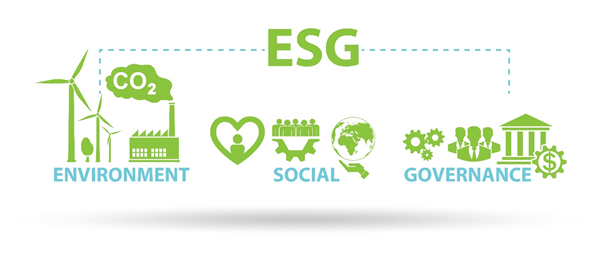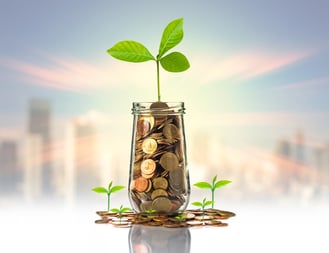In our previous blog, we spoke on Supply Chain Sustainability, along with the key drivers and its impact areas. In continuation, this article seeks to capture its essence in the business practices and the stakeholder impact it can create to build a long term “Sustainable” brand value for businesses.
Environmental, Social and Governance (ESG) initiatives have taken centre stage across businesses – from boardrooms, to corporate governance reports, webinars, media, articles - with companies, investors, asset classes all shifting their focus and re-aligning their growth strategies to “green & sustainable” programmes.

Over the course of last few years, Corporate Social Responsibility (CSR) has paved way for Environmental, Social and Governance (ESG) for many companies, and it is seen that ESG policies and practices have a positive impact on a company’s financial performance and long-term business strategy as well as the enabling attraction and retention of diverse talent, not to mention the overall brand value.
While various aspects of ESG gets customised to a particular business’s long-term success, the process of identifying these areas, tracking and reporting on these aspects, differs widely from company to company, and soon these matrices will get standardized across industry groups and markets.
From Brand Value to Share Price - ESG is creating its footprint
Implemented in the spirit as well as focusing on investors, ESG performance can have a positive impact on workforce sentiment, which can be a major competitive advantage for companies. Employers that make greater efforts to understand employee sentiment tend to achieve greater employee satisfaction and attractiveness to talent, and these same leading companies tend to have more diverse leadership.
There was a time, when investors viewed their product portfolio, its viability and predicted its future to invest in that portfolio class. However, trends have now shifted to more analysis of business policies, which is playing a key role in decision making of investors. Intangible assets such as brand value, intellectual capital, employee practices, carbon emissions, customer loyalty etc are increasing components of corporate value reflected in a company’s stock price.

Some of the parameters that are looked upon- include safety incidents, ethical standards, scandals, natural resource shortages, emissions, product liability claims, etc. Though there isn’t a comprehensive list to measure these parameters, but it is easier to identify positive ESG factors vis-à-vis negative factors, which relatively impacts the business policies and hence impacting stock price volatility.
Examples of company’s ESG issues being aligned with the financial performance of the stock, include brands like PepsiCo, Unilever, Louis Vuitton, who have constantly strived towards ESG initiatives, and have shown consistent growth pattern and stable and strong returns to their stakeholders over the course of the years.
There has been significant impact on stock values—both near and long term—because of ESG related risks that were not well understood or overlooked through reliance solely upon conventional financial analysis, which might have been strengthened by blending in ESG risk analysis applications. ESG factor analysis can give forward-looking insight into performance and risk.
Covid-19 accelerating the ESG Initiatives
Sustainable investing – the integration of ESG factors into analysis and decision making - has seen a remarkable rise over the past couple of years. The outbreak of the Covid-19 virus has not stopped the growth of ESG investing, rather there is seen a steady increase in inflows and better-than-average returns since the start of the pandemic. The pandemic is advancing the strategic case for sustainable investment. The question now arises whether ESG investing and its corporate equivalent, the integration of sustainability into business models, will become the new normal and be the “next wave” which the world would be eying.
The pandemic is also revealing the strengths and weaknesses of governments in coping with the crisis, and is throwing light on the vulnerabilities, and social inequalities across and within societies. While coping with the pandemic, society is getting more and more aware, with governments and policy makers collaborating to promote green energy, technology, human practices and are setting aside huge budgets for the same.
However, irrespective of whether governments will support sustainable market practices through regulatory or fiscal interventions, corporations and investors that aspire long-term success are getting more focussed to increase their sustainability efforts. Key drivers that would enhance the ESG growth are:

Investors Asset Selection- outnumbering conventional funds
ESG investing and asset selection refers to investors setting aside pure profit motives and investing in companies that are good to the environment, to their employees and society, and their shareholders. This phenomenon has already been gaining momentum and with the Covid-19 health crisis, this has accelerated investor focus on sustainable investing. Even through a volatile period in the market where there is uncertainty and outflows from traditional funds, people were putting more money into sustainable investments. Assets in sustainable investment products in Europe are forecast to reach €7.6tn over the next five years, outnumbering conventional funds, as investors’ growing focus on risks including climate change and social inequality pushes these strategies into the mainstream. (As per the FT Report)

With global banks like Société Générale & CitiBank, coming with “green bonds” & “green deposits” respectively, clearly reflecting the sentiments gradually moving towards a more sustainable investment pattern.
While the ESG growth story has just begun, and the next “new norm” would be ESG for governments, businesses, investors, asset classes globally.
ESG growth strategy is not an isolated and individual business directory, it’s a cooperative plan of actions with the business’ partners, suppliers, stakeholders. When the corporate sets up the ESG strategy for themselves, they need to incorporate this plan within their trading partners to succeed. Crossflow enables businesses to align with their ESG framework and support them in their growth story. On our platform the investors have an advantage of having the right set of asset class for investment; providing good leverage for both businesses and investors to grow and move with the “ESG Wave”.
Tony Duggan is co-founder and CEO of Crossflow. He served as Supply Chain  Director at Wickes and B&Q prior to serving as Product Development Director at SWIFT, the global banking network. He also managed an outsourced fintech development project for HSBC in Hong Kong.
Director at Wickes and B&Q prior to serving as Product Development Director at SWIFT, the global banking network. He also managed an outsourced fintech development project for HSBC in Hong Kong.





